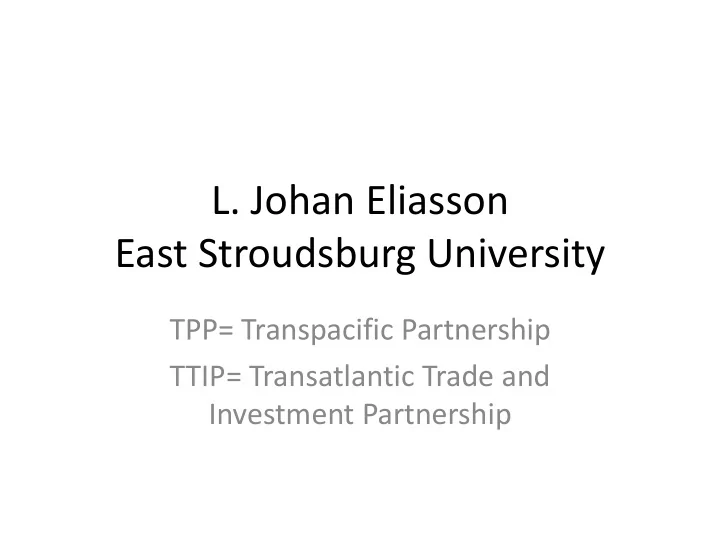

L. Johan Eliasson East Stroudsburg University TPP= Transpacific Partnership TTIP= Transatlantic Trade and Investment Partnership
First….. • Trade = voluntary exchange. Everything else affecting this exchange is created by us. • Modern trade agreements → mostly rules and regulations, incl. on investments. • Technological innovation will not cease w.o. trade agreements • Increased income abroad & here is good for Rotary (and other orgs). • Numerous sector-specific agreements which include the U.S. are being negotiated (Trade In Services Agreement, Environmental Goods Agreement, Information Technology Agreement).
• TPP + TTIP affect countries representing 65% of global GDP • European Union has 24% of global GDP, U.S. 22.5%. • 50% of U.S. foreign investment goes to the EU, NOT cheap labor countries in Asia and Africa. 61% of EU investments go to the U.S. Mutual investment stock over 5 trn • EU-China trading relationship > than US – China. • Europeans export 80% more than the US to China & mutual EU- Chinese investments are MUCH larger than U.S- Chinese investments. • Trade in Goods: Of EU exports and imports 31% is with the U.S., 27% with China. For the U.S. the figures are 35% with the EU & 27% with China. • Trade in Services: 2013: EU exports & imports with the U.S. is 8 times larger than with China, and for the U.S. the figure is 9 time more with the EU • EU attracts 32% (31% 15 yrs ago) of global investments U.S. : 17% (32%) Sources: World Bank, US Department of Commerce, EU DG Trade, Eurostat 2014, 2015
What neither TPP nor TTIP will do. • They will NOT create some powerful IO that can tell the US what to do. • They will NOT allow other countries to follow whatever labor laws they want and still access the US market. • They will NOT touch U.S. : immigration laws; state public procurement beyond the 2012 WTO public procurement modification; protectionist shipping, aviation, or broadcasting laws and regulations. • They will NOT touch the roughly $80K in agricultural subsidies/crop insurance, price guarantees etc we spend per HOUR, 24/7, 365 in the U.S., EU or Japan.
What they will do • TPP & TTIP: Remove most tariffs (import taxes), ease market access in some service sectors, harmonize Rules-of-Origin on products: create equivalencies in some limited areas; have enforceable labor standards & update investor-state dispute settlement systems. • Increase incomes in Vietnam, Malaysia, Peru, Mexico = good for us. • TTIP will further: Open markets, set global standards, ease exports for SMEs, remove or mitigate duplicative and costly processes, ensure state and investor rights, expand equivalencies and MR, ensure liberal & rule-based trade
Why are they good for society? • More jobs, more exports, lower costs, improved purchasing power = less need for charity (Income↑→demands for democracy↑=less conflict= less poverty) • Increased global standards = better enforcement, lower output and retail costs • Fewer obstacles fuel innovation and increases interactions between different people • Opponents: fears of weakened standards, protectionist preferences, short-term job displacements, ‘unfair’ competition.
Recommend
More recommend